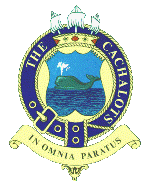The SMMC has a clearly defined set of entry criteria that are designed to ensure that it maintains a professional standard for entry, regardless which branch of the industry a prospective member works within. In this way the Club can offer, within its clubrooms, a comfortable facility in which to discuss maritime issues, or meet friends socially for a drink or lunch. The Club also organises technical discussions at lunch times or in the evening and publishes a record of the proceedings in its quarterly journal, ‘The Cachalot’. In addition to the Sea Pie Supper the Club also organises a Shipping Festival Service at Winchester cathedral and many social functions. This enables the Club to make significant donations to worthy charities.
Who can be a Cachalot?
On February 15th. 1928 a meeting was convened in the Southampton office of The Royal Mail Steam Packet Company and some twenty-one Master Mariners were invited. In the event, four were unable to attend and so the meeting opened under the chairmanship of the Marine Superintendent of Royal Mail and 16 others. The meeting discussed, and decided to establish, a weekly luncheon club that was to be confined exclusively to holders of Foreign-going Master Mariners’ Certificates of Competency.
To ensure much-needed publicity the shipping correspondent of the local paper. “The Southern Evening Echo”, had been invited to attend at the end of the formal proceedings and he was appointed Honorary Recorder of the newly formed club.
Committees were quickly appointed, the Padre of the local Missions to Seamen was appointed Honorary Chaplain – and applications for membership flooded in.
Some time later the established Southampton Master Mariners’ Club adopted the sub-title “ The Cachalots” and it was by this title that the members were (and still are) known. As the Club’s fame and appeal spread it was decided, in exceptional cases, to extend eligibility for membership to “persons whose national status or service is, in the opinion of the Committee, such as to render them suitable for inclusion as “Honorary Members”. These individuals would not enjoy the title of “Cachalot” but would be known as “Stowaways”.
Membership increased rapidly and the Cachalots soon found a clubroom in what had been the Royal Mail Company Officers’ Club. Catering facilities were installed and soon the members were meeting on every working day – including Saturday.
In those days The Port of Southampton was either home to, or a port of call for, many of the largest ships in the world and the offices housing the management of the owning companies were situated in the streets adjoining the port area.
The commercial and technical managers, lacking the qualifications to become Cachalots, attended the club as guests and it was not long before they sought a more formal attachment to this prestigious assembly – and so “Messmates” were born.
The entry of Messmates was not universally popular among the established Cachalots and it was stipulated that they would not wear the Cachalot whale badge, would wear a different tie and would not serve in any administrative committees.
And so membership of the Southampton Master Mariners Club steadily increased and, as the Cachalots, Stowaways and Messmates met socially, they quickly found that they enjoyed each others company – and had common goals and objectives.
Soon, the stipulation that Messmates could not serve on committees was dropped and many of them started to make a significant contribution to the running of the club and its associated activities. Later, the Messmates tie was abandoned (much to the chagrin of many who preferred it!) and they soon sported the silver Cachalot badge at formal functions. As more and more women became involved with the marine industry – ashore and afloat – the Club soon welcomed its first female Cachalot and, very shortly afterwards, the first female Messmates.
More recently the title of “Messmate” was discarded and each and every contributing member of the Club –male or female, seagoing or shore based is now a CACHALOT.
And so today…
The truly global nature of the maritime industry is now, more than ever before, providing business opportunities for many coherent facets of the industry to benefit from a greater degree of networking between them. Southampton’s commercial maritime heritage and reputation was built, and will continue to develop as the UK’s premier port, through the recognition and effective application of this functional interdependence. From a national perspective, both the Government’s South East and South West Regional Development Agencies have identified the importance of Maritime Clusters and Southampton Master Mariners’ have, using this logic over the last few years, extended the membership of its Club from purely ships Masters’ to a correspondingly wider range of ‘Masters’ serving within this multifaceted industry including:
- Professional Ship Operators, military and commercial (Deck, Engineering and Pursers).
- Marine Surveyors.
- Marine Pilots.
- Ship Brokers.
- Port Operators including VTS Operators.
- Marine Insurers & Insurance Brokers.
- Marine Lawyers.
- Freight Forwarders.
- Crewing Agents.
- Hydrographic Surveyors.
- Oceanographic Surveyors.
- Maritime Communications Engineers.
- Maritime Educators.
- Maritime Administrators.
- Shipbuilding and Repairers.
- Maritime Equipment Manufacturers.
- Maritime Leisure Operators.
- Maritime Journalists.
- Maritime Financiers.
If you would be interested to learn more about us please call us on 02380 226155, email us at office@cachalots.org.uk or come and see us on the 1st floor at the Royal British Legion Club, Eastgate Street, Southampton, SO14 3HB on Thursdays or Fridays between 11:00 and 15:00 hrs.
ankara escort
çankaya escort
ankara escort
çankaya escort
ankara rus escort
çankaya escort
istanbul rus escort
eryaman escort
ankara escort
kızılay escort
istanbul escort
ankara escort
istanbul rus Escort
atasehir Escort
beylikduzu Escort
